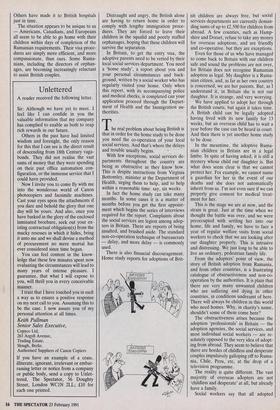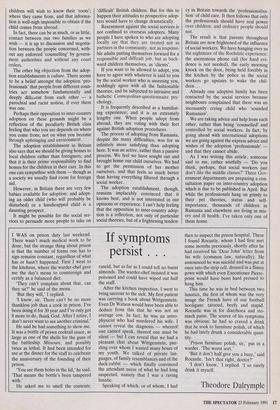LOCKING OUT THE ORPHANS
Jennifer Clarkson on the British
obstruction of her attempts to adopt a young Rumanian
WE HAVE just adopted and brought home a child from Rumania. Our daughter is wonderful, the process of getting her was horrendous. To succeed, you have to go through bureaucratic hell in two countries — but mainly in Britain.
Preparing for an adoption through the Rumanian courts is reasonably straightfor- ward, requiring similar documentation to that needed for a British adoption. The Rumanian authorities are quick, and the proceedings can be finished within a few weeks.
But before you can bring your child home, the British authorities require an entry visa for it, and our embassy in Bucharest has told courts throughout Rumania not to grant adoption orders to British couples who do not have one. This requirement may seem unexceptionable. However, in practice, applying for the visa can take a very long time indeed.
Already at least two children sought for adoption by English couples have died in Rumania, one from pneumonia, during the long wait for their British visas. With proper medical treatment here, there is little doubt that they would have survived. Others have made it to British hospitals just in time.
The situation appears to be unique to us — Americans, Canadians, and Europeans all seem to be able to go home with their children within days of completion of the Rumanian requirements. Their visa proce- dures are simply more efficient, and more compassionate, than ours. Some Ruma- nians, including the directors of orphan- ages, are becoming increasingly reluctant to assist British couples. Distraught and angry, the British alone are having to return home in order to comply with lengthy immigration proce- dures. They are forced to leave their children in the squalid and poorly staffed orphanages, hoping that these children will survive the separation.
In Britain, to get the entry visa, the adoptive parents need to be vetted by their local social services department. You need a 'home study', a report about you and your personal circumstances and back- ground, written by a social worker who has regularly visited your home. Only when this report, with its accompanying police and medical checks, is completed can your application proceed through the Depart- ment of Health and the Immigration au- thorities.
The real problem about being British is that in order for the home study to be done you need the co-operation of your local social services. And that's where the delays and trouble usually begins. • With few exceptions, social services de- partments throughout the country are being as obstructive as they know how. This is despite instructions from Virginia Bottomley, minister at the Department of Health, urging them to help, and to help within a reasonable time: say, six weeks. In fact the home study can take many months. In some cases it is a matter of months before you get the first appoint- ment which begins the series of interviews required for the report. Complaints about the social services are legion among adop- ters in Britain. There are reports of being insulted, and brushed aside. The standard non-co-operation technique of bureaucrats — delay, and more delay — is commonly used.
There is also financial discouragement. Home study reports for adoptions of Brit- ish children are always free, but social services departments are currently deman- ding sums of up to £2,500 for children from abroad. A few counties, such as Hamp- shire and Dorset, refuse to take any money for overseas adoptions, and are friendly and co-operative, but they are exceptions.
Even for those of us who have managed to come back to Britain with our children safe and sound the problems are not over, for Britain does not recognise Rumanian adoption as legal. My daughter is a Ruma- nian citizen, and, as far as her own country is concerned, we are her parents. But, as I understand it, in Britain she is not our daughter. It is strange, and very worrying.
We have applied to adopt her through the British courts, but again it takes time. A British child can be legally adopted having lived with its new family for 13 weeks, but an overseas child has to wait a year before the case can be heard in court. And then there is yet another home study to be done.
In the meantime, the adoptive Ruma- nian children in Britain are in a legal limbo. In spite of having asked, it is still a mystery whose child our daughter is. But what does seem clear is that we cannot protect her. For example, we cannot name a guardian for her in the event of our deaths and she does not automatically inherit from us. I'm not even sure if we can properly give consent for medical treat- ment for her.
This is the stage we are at now, and the strain is great. Just at the time when we thought the battle was over, and we were preoccupied with settling her into our home, life and family, we have to face a year of regular welfare visits from social workers to check that we are looking after our daughter properly. This is intrusive and distressing. We just long to be able to live an ordinary, pedestrian family life.
From the adopters' point of view, the story of British adoption from Rumania, and from other countries, is a frustrating catalogue of obstructiveness and non-co- operation by the authorities. It is plain that there are very many unwanted children who are suffering and dying in other countries, in conditions undreamt of here. There will always be children in this world who need homes. Why, in charity's name, shouldn't some of them come here?
The obstructiveness arises because the adoption 'professionals' in Britain — the adoption agencies, the social services, and most individual social workers — are re- solutely opposed to the very idea of adopt- ing from abroad. They seem to believe that there are hordes of childless and desperate couples impulsively galloping off to Ruma- nia, Chile, Peru, etc, at the drop of a television programme.
The reality is quite different. The vast majority of overseas adopters are not 'childless and desperate' at all, but already have a family.
Social workers say that all adopted children will wish to know their 'roots'; where they came from, and that informa- tion is well-nigh impossible to obtain if the child comes from abroad.
In fact, there can be as much, or as little, contact between our two families as we wish — it is up to discussion and negotia- tion between the people concerned, with- out any enforced 'counselling' by govern- ment authorities and without any court orders.
The other big objection from the adop- tion establishments is culture. There seems to be a belief amongst the adoption 'pro- fessionals' that people from different coun- tries are somehow fundamentally and deeply difteLent from each other — a parochial and racist notion, if ever there was one.
Perhaps their opposition to inter-country adoption on these grounds might be a reflection of the peculiarly British class feeling that who you are depends on where you come from; not on what you become through upbringing and environment.
The adoption establishment in Britain also says that we should be giving homes to local children rather than foreigners; and that it is their prime responsibility to find homes for the children in their care. In this one can sympathise with them — though as a society we usually find room for foreign aid.
However, in Britain there are very few babies available for adoption; and adopt- ing an older child (who will probably be disturbed) or a handicapped child is a daunting prospect. It might be possible for the social ser- vices to persuade more people to take on 'difficult' British children. But for this to happen their attitudes to prospective adop- ters would have to change dramatically.
Resentment against the social services is not confined to overseas adopters. Many people I have spoken to who are adopting locally say that they are treated not as partners in the community, not as responsi- ble adults putting themselves forward for a responsible and difficult job, but as back- ward children themselves, as 'clients'.
If you want to be allowed to adopt, you have to agree with whatever is said to you by the social worker who is assessing you, noddingly agree with all the fashionable theories, and be subjected to intrusive and bathetic Cosmopolitan-questionnaire psy- chology.
It is frequently described as a humiliat- ing experience; and it is an extremely lengthy one. When people adopt from abroad, they are voting with their feet against British adoption procedures.
The process of adopting from Rumania, despite the many difficulties, was for us infinitely more satisfying than adopting here. It was an active, rather than a passive process. We feel we have sought out and brought home our child ourselves. We had to get the permission of her mother ourselves, and that feels so much better than having everything filtered through a social worker.
The adoption establishment, though, remains implacably convinced that it knows best, and is not interested in our opinions or experience. I can't help feeling that the opposition to inter-country adop- tion is a reflection, not only of particular social theories, but of a frightening tenden- cy in Britain towards the `professionalisa- tion' of child care. It then follows that only the professionals should have real power over children, and ordinary people should not.
The result is that parents throughout Britain are now frightened of the influence of social workers. We have hanging over us the nightmare of the Rochdale experience: the anonymous phone call (for hard evi- dence is not needed), the early morning knock on the door, being held forcibly in the kitchen by the police as the social workers go upstairs to wake the chil- dren...
Already one adoptive family has been contacted by the social services because neighbours complained that there was an incessantly crying child who 'sounded Rumanian'.
We are taking advice and help from each other, rather than being 'counselled' and controlled by social workers. In fact, by going ahead with international adoptions we are going against the express advice and wishes of the adoption 'professionals' — and that they cannot abide.
As I was writing this article, someone said to me, rather wistfully — 'Do you think, perhaps, that social workers just don't like the middle classes?' Three Gov- ernment departments are preparing a con- sultation paper on inter-country adoption which is due to be published in April. But while the professionals hang on grimly to their pet theories, status and self- importance, thousands of children in Rumania and elsewhere are living in mis- ery and ill health. I've taken only one of them home.




















































 Previous page
Previous page